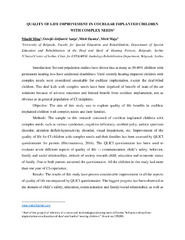Приказ основних података о документу
Quality of life improvement in cochlear implanted children with complex needs
| dc.creator | Nikolić, Mina | |
| dc.creator | Ostojić-Zeljković, Sanja | |
| dc.creator | Mirić, Danica | |
| dc.creator | Mirić, Maja | |
| dc.date.accessioned | 2021-06-17T13:59:15Z | |
| dc.date.available | 2021-06-17T13:59:15Z | |
| dc.date.issued | 2019 | |
| dc.identifier.uri | http://rfasper.fasper.bg.ac.rs/handle/123456789/3127 | |
| dc.description.abstract | Introduction: Several population studies have shown that as many as 30-40% children with permanent hearing loss have additional disabilities. Until recently hearing impaired children with complex needs were considered unsuitable for cochlear implantation, except the deaf-blind children. The deaf kids with complex needs have been deprived of benefit of state-of-the-art solutions because of adverse outcomes and limited benefit from cochlear implantation, not as obvious as in general population of CI recipients. Objective: The aim of this study was to explore quality of life benefits in cochlear implanted children with complex needs and their families. Methods: The sample in this research consisted of cochlear implanted children with complex needs, such as various syndromes, cognitive deficiency, cerebral palsy, autistic spectrum disorder, attention deficit-hyperactivity disorder, visual impairment, etc. Improvement of the quality of life for CI children with complex needs and their families has been assessed by QLICI questionnaire for parents (Herrmannova, 2016). The QLICI questionnaire has been used to evaluate seven different aspects of quality of life -– communication, child’s safety, behavior, family and social relationships, attitude of society towards child, education and economic status of family. One or both parents answered the questionnaire. All the children in this study had more than one year of CI experience. Results: The results of this study have proven considerable improvement in all the aspects of quality of life encompassed by QLICI questionnaire. The biggest progress has been observed in the domain of child’s safety, education, communication and family/social relationship, as well as mina.mikic@gmail.com 1 Part the overall level of satisfaction. The least benefit from CI implantation in complex kids have been achieved regarding economic status of family. Conclusion: Cochlear implantation in children with complex needs has shown s significant benefit regarding quality of life, although the outcome regarding speech-language development is not as prominent as in children without additional handicap. | |
| dc.rights | openAccess | |
| dc.rights.uri | https://creativecommons.org/licenses/by-sa/4.0/ | |
| dc.source | Book of abstract ESPCI 2019 | |
| dc.subject | complex needs | |
| dc.subject | cochlear implantation | |
| dc.subject | quality of life | |
| dc.title | Quality of life improvement in cochlear implanted children with complex needs | en |
| dc.type | conferenceObject | |
| dc.rights.license | BY-SA | |
| dc.description.other | European Symposium on Pediatric Cochlear Implantation | |
| dc.identifier.fulltext | http://rfasper.fasper.bg.ac.rs/bitstream/id/8730/bitstream_8730.pdf | |
| dc.identifier.rcub | https://hdl.handle.net/21.15107/rcub_rfasper_3127 | |
| dc.type.version | publishedVersion |


